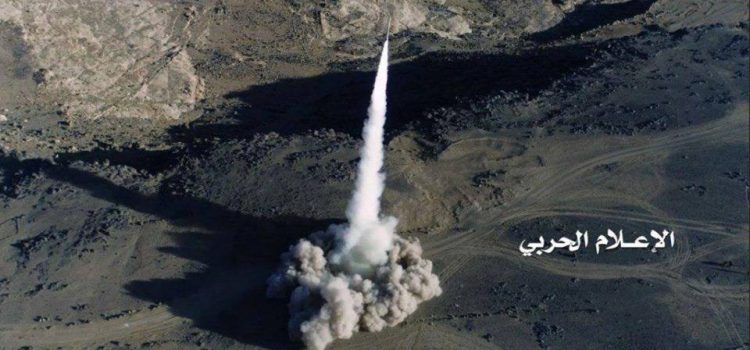Yemeni forces hit Saudi military targets with ballistic missiles : Report
Yamanyoon
Yemeni army forces have fired a short-range domestically-manufactured missile at a Saudi military base in the kingdom’s provinces in response to the US-Saudi-led coalition’s campaign against their country.
The Yemeni missile force hit the Saudi Duty camp with Najran with a ballistic missile, Badr 1, hitting its target accurately and causing its enemy heavy losses.
It also launched a missile type Zilzal-1 on Jizan region, targeting gatherings of Saudi army off al-Khoba area.
They, yesterday, issued a military statement that revealed the details of the luring operation process in Al-Duraihemi district south of Hodeidah during the past hours, which resulted in killing and wounding dozens of the coalition forces in addition to capturing a large number of them.
The Anti-Armor Unit of the Yemeni army forces announced the destruction of more than 50 armored vehicles in July on various fronts with guided missiles. According to the Unit, the forces lost in the coastal front over 22 vehicles and armored vehicles which were destroyed by guided missiles and direct shellings.
It also pointed out that they targeted 9 gatherings of the paid fighters on a number of frontlines, killing and injuring large numbers of them with guided missiles in the same period. The statement said that the operation killed, injured and captured over 150 paid fighters including important leaders, a battalion and various numbers of the coalition forces were in the deadly siege in a number of points. They destroyed 10 military types of machinery, killing those on board.
Head of the supreme revolutionary committee, Mohammed Ali Al-Houthi, called on Monday the state of Canada to open its embassy in the capital of Sanaa.”I call on the Canadian state to open its embassy in the Republic of Yemen in the capital, Sanaa,” Houthi posts in his Twitter account. Al-Houthi said in another tweet that the Saudi considered the call of the Canadians to release civil society activists as an opportunity to retaliate after being fed up with Canada’s oil competition, describing the decision to expel the Ambassador of Canada as the idiot. “If all the principles were not there and still one justification remains, it would enough for the Yemeni people to reject the foreign intervention in its internal affairs of any regime, ” he added.
President Mahdi al-Mashat praised on Monday the roles of Bani Dhabian sheikhs and tribesmen of Sanaa province to confront the coalition. During his meeting with the governor of Sanaa province Hunain Qutainah and several sheikhs, the president stressed enhancing the internal front.
In the presence of senior political and military leaders, people of Taiz governorate held a meeting of extended consultation led by the governor of the province, Abdu Al-Jundi, against the flagrant violations and arrests by the paid fighters of the coalition towards Yemeni women.
In addition, people and sheikhs of Dhamar province on Monday held a tribal meeting to confront the war crimes committed by the Saudi-led coalition.
Tribes of Mahweet province, as well as, announced on Monday in a mass rally the public mobilization to support the fronts. In the rally, which attended officials, security and military leaders, the Mahweet tribes called for strengthening the unity of ranks and the internal front to retaliate the coalition’s crimes.
The coalition has been striking Yemen since March 2015 to restore power to Mansour Hadi, a close ally of Riyadh. The Saudi-led aggression has so far killed and wounded at least 600,000 Yemenis, including hundreds of women and children.
Despite the coalition’s claims that it is bombing the positions of the Ansarullah fighters, part of the Yemeni army forces, the coalition’s bombers are flattening residential areas and civilian infrastructures.
According to several reports, the campaign against Yemen has driven the impoverished country towards humanitarian disaster, as the coalition’s deadly campaign prevented the patients from traveling abroad for treatment and blocked the entry of medicine into the war-torn country.
Yemen is the world’s largest humanitarian crisis with more than 22 million people in need and is seeing a spike in needs, fuelled by ongoing conflict, a collapsing economy and diminished social services and livelihoods.
Several Western countries, the United States and Britain in particular, are also accused of being complicit in the ongoing aggression as they supply the Riyadh regime with advanced weapons and military equipment as well as logistical , intelligence and ground assistance.

